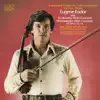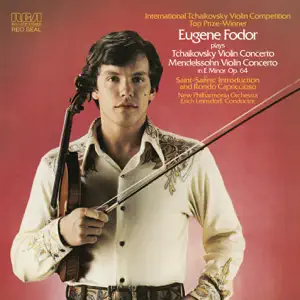


Acerca de Eugene Fodor
Eugene Fodor was dubbed the Van Cliburn of the violin after his success in the 1974 Tchaikovsky International Competition. Though he finished in a three-way tie for second, his results were viewed as a victory, as no first prize was awarded and because he had placed higher in that prestigious competition than any American violinist up to that time. Met by his parents and horse at the airport on his return to Colorado, he would be given a second moniker, the cowboy violinist. He initially benefitted from such stunts and became a genuine overnight sensation, with major concert engagements, a recording contract with RCA, and numerous appearances on Johnny Carson's popular Tonight Show. But after a decade or so his career cooled, in part because of the slick marketing associated with his glamor and handsome looks, but also because he was not fully mature as an artist when he was thrust into the limelight. Later on, drugs and alcohol helped sabotage whatever hope he had of a comeback. Fodor had an all-encompassing technique and broad repertory that, on the Classical side, featured works by Paganini, Mendelssohn, Brahms, Lalo, Sibelius, Nielsen, and Ravel, and on the crossover side included pieces by Cole Porter, Richard Rodgers, McCartney, Streisand, Lionel Richie, and a spate of others. Some of his recordings are still available from RCA, Clarity, and Grazioso Records.
Eugene Fodor was born in Denver, CO, on March 5, 1950. From age five he studied violin, and at ten debuted with the Denver Symphony in a performance of the Bruch First Concerto. His advanced studies were at Juilliard with Dorothy DeLay and Ivan Galamian, and at Indiana University Jacobs School of Music with Josef Gingold. He also studied privately with Jascha Heifetz.
In 1972 Fodor won the prestigious Paganini Competition in Genoa, Italy. Following his Tchaikovsky success in 1974, Fodor remained a major presence on the concert scene until about the mid-'80s. Substance abuse led to illegal drug charges in 1989 and much negative publicity. Though he continued concertizing afterward, Fodor could never recapture the spotlight, despite the reasonably high artistic level of his performances. Often he had to settle for concert appearances with second-tier orchestras and in less prestigious performance venues. Fodor remained active in the new century, but finally withdrew from concert performance in 2010, disappointed with the direction of his career. Fodor died of cirrhosis on February 26, 2011.
Eugene Fodor was born in Denver, CO, on March 5, 1950. From age five he studied violin, and at ten debuted with the Denver Symphony in a performance of the Bruch First Concerto. His advanced studies were at Juilliard with Dorothy DeLay and Ivan Galamian, and at Indiana University Jacobs School of Music with Josef Gingold. He also studied privately with Jascha Heifetz.
In 1972 Fodor won the prestigious Paganini Competition in Genoa, Italy. Following his Tchaikovsky success in 1974, Fodor remained a major presence on the concert scene until about the mid-'80s. Substance abuse led to illegal drug charges in 1989 and much negative publicity. Though he continued concertizing afterward, Fodor could never recapture the spotlight, despite the reasonably high artistic level of his performances. Often he had to settle for concert appearances with second-tier orchestras and in less prestigious performance venues. Fodor remained active in the new century, but finally withdrew from concert performance in 2010, disappointed with the direction of his career. Fodor died of cirrhosis on February 26, 2011.
Nosotros
Notas
